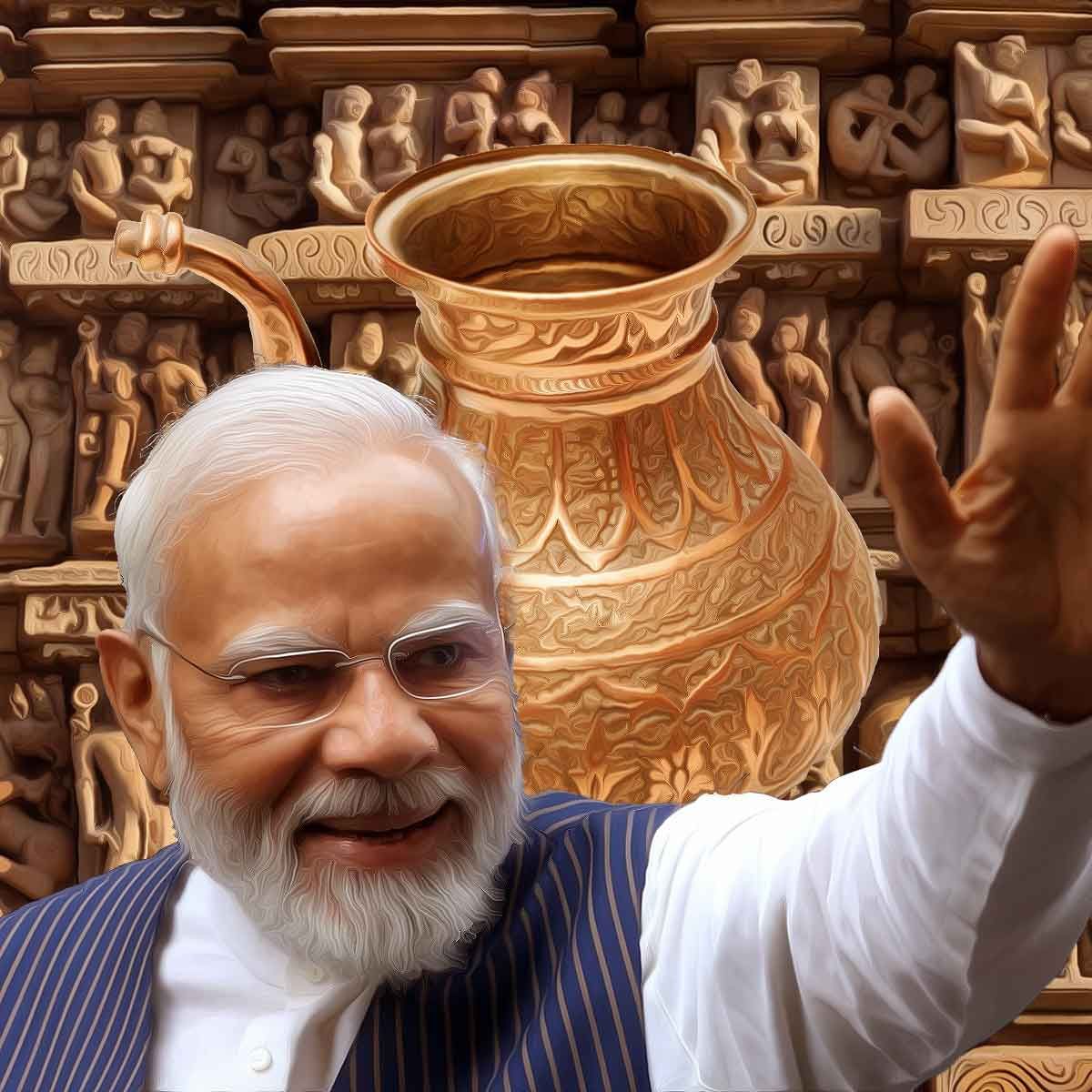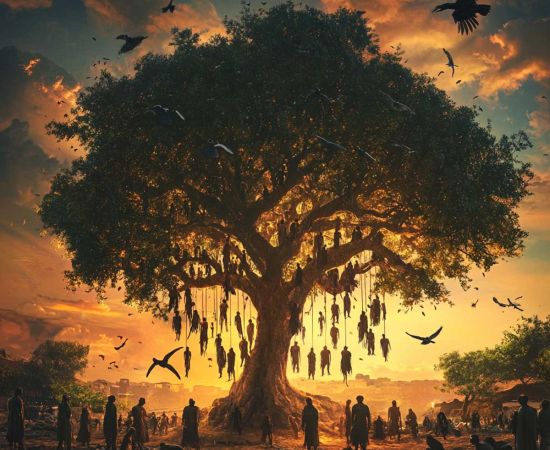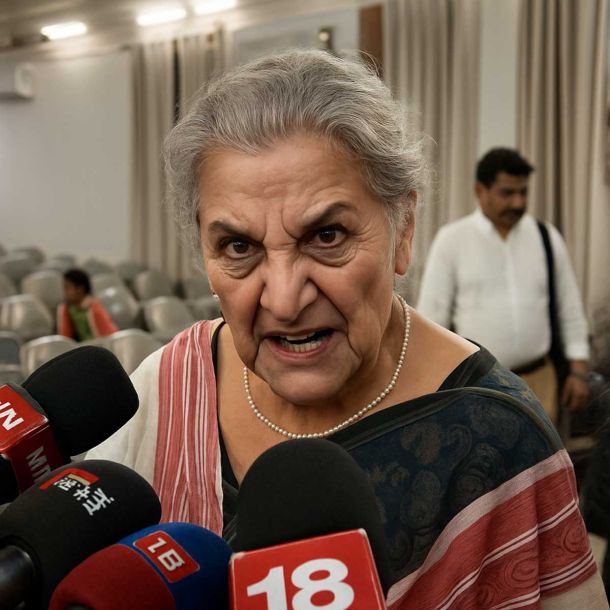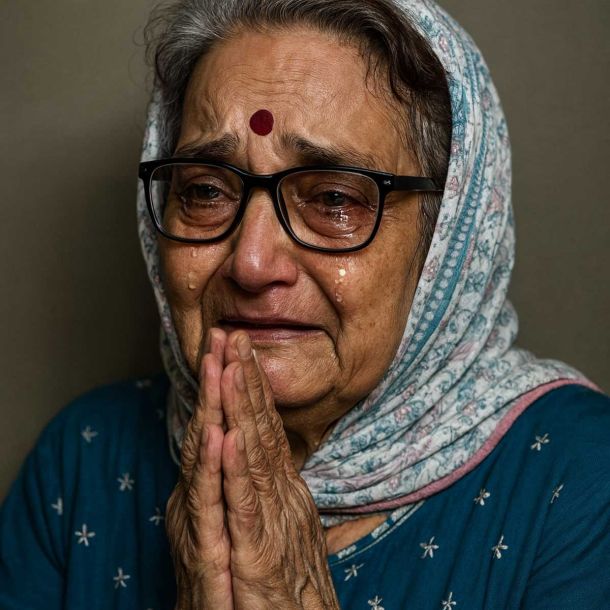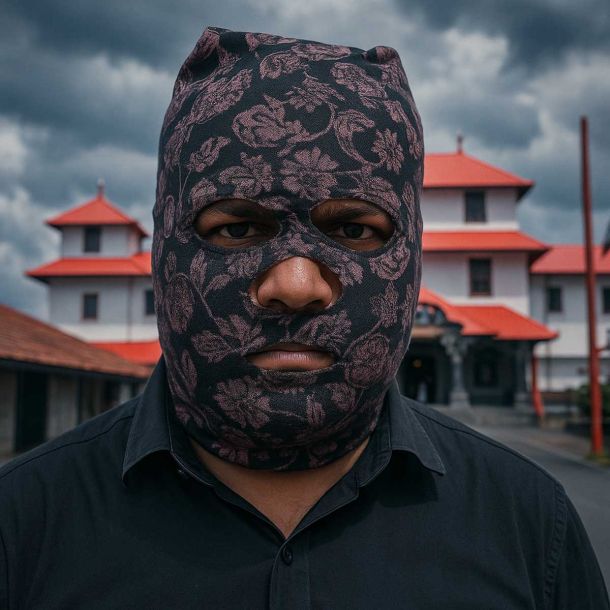MORE COVERAGE
Twitter Coverage
Satyaagrah
Written on
Satyaagrah
Written on
Satyaagrah
Written on
Satyaagrah
Written on
Satyaagrah
Written on
JOIN SATYAAGRAH SOCIAL MEDIA
"Hindu? Guilty as Charged!": Pakistani Hindu girl, Rajeeta Kolhi, abducted, forcibly converted to Islam, and married off to her kidnapper; despite her pleas in court to return to her parents, she was sent to Islamic 'Dar-Ul-Aman' shelter by the judiciary

In a nation where religious minorities constantly grapple with prejudice, the distressing case of Rajeeta Kolhi serves as a stark reminder of the grim challenges faced by Hindu girls in Pakistan. Rajeeta, a Hindu girl, became yet another face of the disturbing trend where young minority women are abducted, forcibly converted to Islam, and married off to their kidnappers.
|
Rajeeta's desperate pleas for justice and to be reunited with her family sadly fell on deaf ears. Instead of ensuring her safety and delivering justice, the magistrate made a perplexing decision. Despite her fervent appeals, she was sent to the "Dar-Ul-Aman," an Islamic shelter home. This decision not only raises eyebrows about the effectiveness of Pakistan's judicial system for minorities but also accentuates the deep-rooted bias and discrimination that Hindus face in the nation.
This incident, among countless others, raises pressing questions about the state of minorities in Pakistan. How many more Rajeetas need to suffer before substantive change is seen? The international community must take note of these grave human rights violations and urge Pakistan to ensure the safety and rights of its minority communities.
In a world that prides itself on progress and inclusivity, such incidents are a blot on humanity. It's high time that the global community comes together to address and eradicate such deep-seated prejudice and ensure that no girl, irrespective of her faith, has to endure what Rajeeta Kolhi went through.
The haunting tale of Rajeeta Kolhi's abduction and subsequent torment paints a chilling picture of the adversities faced by minority girls in Pakistan. Abducted from her home at gunpoint, Rajeeta was plunged into a nightmare of captivity and brutality in Karachi. Subjected to gang rape and a forced marriage to her very kidnapper, Ashiq Ahmadani, her ordeal seemed unending. Just when it appeared that things couldn't get any worse, Rajeeta discovered she was about to be sold off in Hyderabad.
|
However, demonstrating immense resilience and courage, Rajeeta managed to break free from her captors' clutches, fleeing to Mirpurkhas. But the threat wasn't over. The young girl's fears of being recaptured loomed large, given the alarming trend of re-abductions prevalent in Pakistan.
In her quest for justice and safety, Rajeeta approached the court, begging to be returned to her family. Yet, in a decision that baffled many, the court mandated her placement in Dar-ul Aman, a so-called safe house for women. While such institutions are typically viewed as sanctuaries for women in distress, Rajeeta's clear preference was to return home. Tragically, her heart-wrenching appeals in court fell on seemingly indifferent ears. The lingering question remains: Why is the voice of a tormented girl, longing for the warmth and security of her family, being silenced?
In an alarming recurrence, the menace of re-abductions surfaces prominently in Pakistan, as highlighted by the sorrowful tale of Meena Kolhi. After enduring a staggering 14 months of confinement and being subjected to gang-rape by a group of seven from the same clan, one would hope Meena had seen the last of her abusers. However, in a sinister twist, her original captors once again ensnared her in June. The depth of the tragedy deepens with the poignant fact that Rekha, Meena's younger sibling who was abducted alongside her, remains unaccounted for.
The gloom surrounding the plight of abducted girls deepens when one peers into the so-called "government shelter homes" they are relegated to. Tales of sheer horror emerge from these premises, painting a grim picture of sexual, physical, and mental torment. But what's more alarming is the unchecked access alleged abductors, often armed with connections to the influential military-mullah nexus, have to these supposed havens. This not only re-traumatizes the victims but keeps them agonizingly distant from their grieving families.
Amidst this bleak landscape, beacons of hope like Shiva, Co-Chairman & Founder of the Minority Rights Organization, shine through. Tirelessly championing the cause of the oppressed, such activists are up against a system that seems complicit in the ongoing persecution of Pakistani Hindus.
|
The Silent Suffering of Hindu Girls in Pakistan
In the annals of human rights, few issues are as hauntingly persistent as the plight of Hindu girls in Pakistan. Despite the outcry from a handful of conscientious voices like Pakistani Hindu, Danish Kaneria, the silence from prominent figures, especially those in neighboring Bharat, is deafening. One cannot help but question - why the indifference?
A Snapshot of The Crisis:
The Unseen Epidemic: Every year, around 1000 young Christian and Hindu girls fall prey to abductions and are forced into Islam. Their futures, once filled with dreams and aspirations, are brutally truncated as they're thrust into forced marriages, often with men old enough to be their fathers. The trauma doesn't end here. Many face sexual violence, some are trafficked, while others disappear into the abyss of forced prostitution.
Religious Misguidance: In a horrifying twist, some seminaries propagate the notion that coercing Hindu girls into Islam is Haj-e-Akbari, a supreme religious duty. This deeply entrenched belief further fuels the cycle of abductions and conversions.
Disturbing Statistics: Between 2004 and 2018, the Sindh province alone witnessed a staggering 7430 reported cases of Hindu girl kidnappings. With many cases going unreported due to fear or societal pressure, the actual numbers are undoubtedly higher.
A Legal Vacuum: Pakistan's legal framework is woefully inadequate when it comes to protecting underage minority girls. The absence of laws to prevent abductions, forced conversions, and marriages leaves these girls vulnerable and bereft of justice.
Pakistan, a land steeped in history, has roots that reach deep into the Indus Valley Civilization, with ancient cities such as Harappa and Mohenjo-daro standing as testament. Located in the present-day provinces of Punjab and Sindh, these cities were once bustling centers of the Hindu community.
|
|
There’s been a drastic decline of the indigenous Hindu population
The tumultuous events of 1947, however, cast a long shadow on this legacy. The partition of India, driven by the Muslim League's demand for a separate nation, led to unparalleled violence and displacement. The consequence was heart-wrenching: millions of Hindus and Sikhs, in a desperate bid for safety, had to abandon their homes in West and East Pakistan (now Bangladesh) and head to India.
The ramifications of this mass exodus were profound. From constituting 15% of West Pakistan's populace during partition, the Hindu demographic nosedived to approximately 2% by 1951. The situation further deteriorated with the anti-Hindu riots of 1964, propelling even more Hindus towards India. Today, they comprise a mere 1.6% of Pakistan's population, with many still seeking refuge in India to escape persecution.
This decline is even more pronounced in cities with historically significant Hindu populations. Take Lahore, for instance. In 1941, Hindus and Sikhs together made up around 40% of the city's inhabitants. Fast forward to today, and they account for less than 1%. A city that once reverberated with the sounds of numerous temples, now only has two functional Hindu temples.
The poignant narrative of Pakistan's indigenous Hindus is not just a tale of numbers; it's a chronicle of a legacy gradually fading into oblivion.
|
The country's legal framework seems to embody a dichotomy that often leaves its religious minorities in a quandary.
On one hand, the Pakistani constitution, under Articles 20-22, magnanimously extends the promise of religious freedom to all its citizens. A beacon of hope, one might think. Yet, the introduction of Islamic law in 1977 casts a shadow over this promise. The regulations and constitutional edicts stemming from this law inherently contradict the essence of religious freedom, especially for non-Muslims. A glaring example of this contradiction is the constitutional mandate that reserves the presidential post exclusively for Muslims. Further amplifying this paradox is the obligation for high-ranking officers to recite an Islamic prayer during their oath-taking, irrespective of their personal faith.
But the labyrinth of Pakistan's legal paradoxes doesn't end here. The nation's Penal Code, particularly Sections 295B and C, and 298A-C, harbors the notorious blasphemy laws. These sections impose stringent punishments for perceived affronts to Prophet Mohammed or the Koran's desecration. It doesn't stop at that; they go a step further, prohibiting the Ahmadiyya community from embracing Islamic terminologies and symbols and evangelizing their faith. The penalties for these perceived transgressions are severe, ranging from fines and three-year imprisonments to life sentences and even the death penalty.
|
The grim reality of these laws isn't just confined to paper. In 2019, as per the US State Department, a staggering 84 individuals found themselves behind bars on blasphemy charges, with 29 of them staring at the abyss of a death sentence. The ripple effects of these laws are felt even outside the courtroom. Mere accusations can ignite the flames of mob fury. A chilling illustration of this occurred in Ghotki in 2019. A mere blasphemy accusation against a Hindu school principal became the catalyst for a violent rampage. A frenzied mob, driven by unverified claims, laid siege to three Hindu temples, several shops, a school, and a school, underscoring the volatile repercussions of the nation's contradictory laws.
Amidst this legal quagmire, the minorities of Pakistan, more often than not, find themselves marginalized, their voices muffled, and their rights curtailed. The promise of religious freedom remains elusive, overshadowed by the towering edifice of laws that seem to contradict the very essence of equality and justice.
|
Ancient temples are disappearing and new ones are under attack
The number of Hindu temples dotting Pakistan's landscape has been on a steady decline. What's more distressing is the palpable apathy of the government in the face of recurrent attacks on these sacred edifices.
The narrative of intolerance isn't just confined to existing temples. Any attempt to erect new temples is met with vehement opposition, as was evident in July 2020. The budding walls of what was envisioned to be Islamabad's premier Hindu temple were razed to the ground by radical Islamists. Initially, the federal government, in a gesture of goodwill, greenlit the temple's construction. However, the mounting pressure from hardliners, media, and the general populace forced a policy reversal, with the government capitulating to the dominant narrative that a Hindu temple had no place in an Islamic nation.
This systemic marginalization and the government's passive stance have rendered the Hindu community powerless in their fight to safeguard their sacred spaces. The vivid imprints of this apathy can be seen in incidents like the desecration of the Mata Rani temple, where sacred scriptures were set ablaze. Or the heart-wrenching episode where a temple dedicated to Lord Hanuman was razed, along with the homes of 20 families. And in all these instances, the cries for justice fell on deaf ears.
The fading murals, the crumbling walls, and the silenced bells tell a story of a once-thriving community, now overshadowed by intolerance and neglect. The rich tapestry of Pakistan's diverse heritage is fraying at the edges, with the vibrant threads of its Hindu legacy being pulled apart, one temple at a time.
|
The Dark Clouds of Extremism Overshadowing Pakistan
It's a chilling reality that in the heart of Pakistan, extremist ideologies and sectarian violence are not just on the rise; they are thriving. Pakistan has, over the years, become a fertile ground for extremist factions and terrorist outfits that operate with impunity, championing the cause of Islamic supremacy, violent jihad, and harbouring an unsettling animosity towards non-Muslims.
Many of these factions have been embroiled in a shadowy proxy war, notably in India's Union Territory of Jammu and Kashmir since the tumultuous 1980s. Their reach isn't limited to isolated pockets of radicalism. These groups wield considerable influence over Pakistan's government and its policies, shaping the nation's ethos and its educational fabric.
In a recent manifestation of this influence, under pressure from Islami-Jamiat Talaba, an Islamic student body, the Punjab provincial government mandated Koranic studies at universities. The National Assembly of Pakistan followed suit, ushering in the Compulsory Teaching of the Holy Koran Bill. This legislation mandates Koranic education from Grade 1 through 12 across all federal educational institutions.
|
The educational landscape isn't just about pushing religious doctrines. A more sinister curriculum thrives within the walls of both public schools and Islamic madrassas. Disturbingly, textbooks are rife with inflammatory content, painting Hindus and Christians in a derogatory light, with statements like “A Hindu has always been an enemy of Islam.”
Madrassas, Islamic seminaries notorious for being the alma mater of many Taliban militants, further amplify these extremist ideologies. With an alarming 40,000 madrassas dotting the country, in certain regions, they even outnumber mainstream public schools.
The seeds of radicalism are sown early. A deeply unsettling video on TikTok epitomized this – a child, no older than five, issued a threat to Prime Minister Khan, vowing to kill a Hindu if the construction of a temple in Islamabad were to proceed. His father, far from reprimanding, appeared on camera, endorsing this disturbing sentiment. Tragically, this isn't an isolated incident. The digital realm is awash with such videos, each echoing the same grim sentiment: the vilification of non-Muslims.
It's a somber reflection of a nation's trajectory, where the voices of moderation are drowned out by the clamor of extremism, and where the bright promise of a diverse and inclusive future is overshadowed by the dark clouds of intolerance and hate.
 Support Us
Support Us
Satyagraha was born from the heart of our land, with an undying aim to unveil the true essence of Bharat. It seeks to illuminate the hidden tales of our valiant freedom fighters and the rich chronicles that haven't yet sung their complete melody in the mainstream.
While platforms like NDTV and 'The Wire' effortlessly garner funds under the banner of safeguarding democracy, we at Satyagraha walk a different path. Our strength and resonance come from you. In this journey to weave a stronger Bharat, every little contribution amplifies our voice. Let's come together, contribute as you can, and champion the true spirit of our nation.
 |  |  |
| ICICI Bank of Satyaagrah | Razorpay Bank of Satyaagrah | PayPal Bank of Satyaagrah - For International Payments |
If all above doesn't work, then try the LINK below:
Please share the article on other platforms
DISCLAIMER: The author is solely responsible for the views expressed in this article. The author carries the responsibility for citing and/or licensing of images utilized within the text. The website also frequently uses non-commercial images for representational purposes only in line with the article. We are not responsible for the authenticity of such images. If some images have a copyright issue, we request the person/entity to contact us at This email address is being protected from spambots. You need JavaScript enabled to view it. and we will take the necessary actions to resolve the issue.
Related Articles
- Muslim singer and model he/she/they Leo Kalyan sporting a beard on a dress performed at baby shower event of Bollywood actor Sonam Kapoor, who is expecting her first child with husband Anand Ahuja
- Musical call for jihad: ‘melodious’ songs inciting for the genocide and beheading of Kafirs are terrifying
- "From moon to loan missions, the Pakistani saga": Ex-PM Nawaz Sharif is back, crying that while India is making moon trips, Pakistan's top job seems to be asking the world for spare change, quite the cheeky take on Pakistan's 'moon vs spoon' moment!
- "Now or Never; Are We to Live or Perish Forever," declared Rahmat Ali in his Pakistan Declaration, coining 'Pakstan,' setting the stage for Iqbal, Jinnah, and Nehru to shape the subcontinent's transformative history amid objections from the Hindu press
- "Compassion has enemies, and those enemies are things like pity, moral outrage, fear": India calls on Pakistan to protect minorities after killing of Hindu woman Daya Bheel in Sindh province, her body was severed, breasts chopped and was beheaded
- More controversial TISS papers surface: ‘India controlled Kashmir’, ‘Military Occupation’, romance with a research subject and embracing Islam
- ‘Pakistan wants no hostility with India for 100 years, but rapprochement with India not possible when Modi govt is in power’: Pakistan to unveil its first-ever National Security Policy
- Pakistani TikToker Hareem Shah landed herself in a bit of a pickle when released a video with botched up lip job: Because of Federal Investigative Agency, she had to leave the procedure midway
- Following NIA’s demand for death penalty for terrorist Yasin Malik, Pakistanis have started shedding tears and seeking immediate UN intervention: Calls India ‘fascist’ and that gross human rights violation by Modi
- "बच्चा बाजी": Bacha bazi remains a brutal tradition in Afghanistan & Pakistan—young boys dressed as dancers, raped by powerful men, and discarded in silence, as poverty, corruption and denial turn this pedophilic nightmare into a protected cultural farce
- "कौम से चाय कम पीने की अपील": Pakistani Federal Minister Ahsan Iqbal urged people of Pakistan to reduce their tea intake to keep economy afloat, Pakistan is world’s largest importer of tea and had to borrow money to import tea
- Operation Polo: When India annexed Hyderabad from the Nizam and Razakars, the suppression of Hindus and the role of Nehru
- "Anyone can speak Troll. All you have to do is point and grunt": Weeks after Alt news co-founder got out on bail, #ArrestZubair trends again as Mohammed Zubair works in tandem with Pakistan to build “Khalistan” narrative against cricketer Arshdeep Singh
- Lahore’s Madam N, backed by embassy insiders like Danish, lured Jyoti Malhotra and other Indian influencers into spying for ISI, building a 500-agent sleeper cell—using fake pilgrimages, forged visas, and emotional bait to quietly bleed India from within
- Operation Tupac is up and running by ISI of Pakistan in collaboration with Foreign-based organisations to lobby against India on global forums: Disinfo Lab report reveals Fascism, Genocide and Islamophobia used as a keyword















